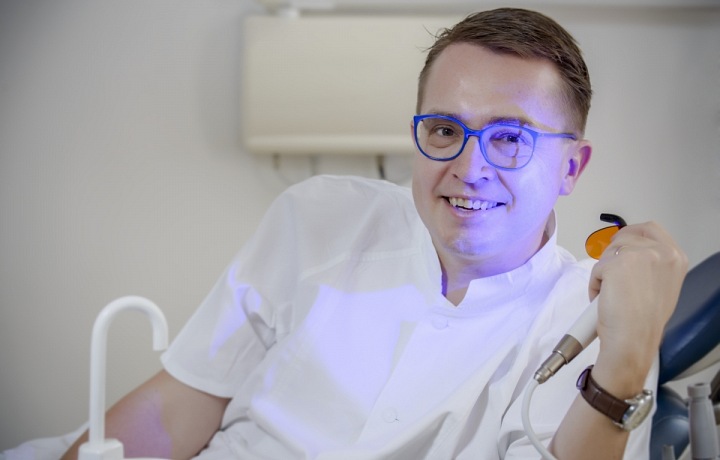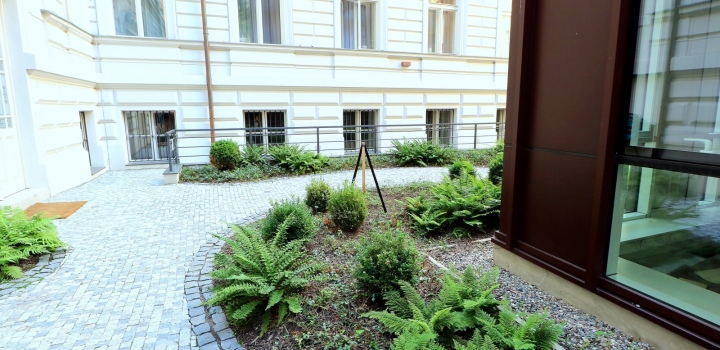Fast confession - Roman Šmucler: The shape of one's labia didn't use to be an issue
At first glance it looks like Roman Šmucler is some kind of superman. He works in the field of dental surgery, he's the president of the Council of the Association of Dental Surgeons, he owns a plastic surgery clinic and on top of that sometimes "hops off" to host something on TV. In an interview with LP-Life.com, we talked to him mostly about the current trends in plastic surgery, laser labia surgeries and saving children with vascular tumors. His clinic treats these children even though the surgeries are performed at a loss. "If all you ever did was inject botox in people to treat wrinkles, you'd just get tired of it," Šmucler explains in the interview.
I heard that you have some sort of a dental anomaly. What is it?
I grew three upper central incisors. And after the doctors did their thing, I only have one left. (laugh) So it wasn't really solved in the ideal way and I provoke my dentist colleagues with it. Everyone says I should lead by example and have my teeth straightened, extracted, get stuff fixed. But I think that teeth should be healthy first.
I'm not a promoter of aesthetics at any cost. It sounds paradoxical, because Asklepion is a plastic surgery institute. But it really mostly relates to me mostly being a doctor rather than dealing mostly with aesthetics. When you only deal with aesthetics, you deal with money, and sometimes you sell people stuff that doesn't work.
How does it happen that somebody just grows really non-standard teeth?
Three central incisors being "born" isn't an extremely rare occurrence. With us it's caused by having it in the family too. My daughter has nine kinds of teeth, for a change. It's some kind of a genetic thing. I always say that we are developmentally delayed. Because more and more people these days are born with seven kinds of teeth, and we as a family have nine. That's bad. (laughing)
When I look at Czechs, they have generally pretty nice things, especially if you compare them to Brits, for example...
Here more people put their money into teeth, which might be related to us being former German territory. In some places people show their wealth with cars or houses, typically Britain. Czechs want to look neat, want to have their teeth straight, white and okay. And at the same time they don't want to be too extravagant. Then there's Russia, for example, which is utter paradise for plastic surgery. Over there, young boys and young girls put their last remaining money in aesthetics.
And what about South Korea? Over there the investment into beauty is an investment into one's future of sorts, beautiful people get a better paid job and have a better social standing. Parents gift their children plastic surgery for their birthdays.
That's true and not only in Korea. Beautiful people have a better life, that's just the way it is. And it's mostly true, let's be sexist now, among women. A pretty woman has it much easier in life.
But when Korea is concerned, it's a little bit different, they want to create individuality. Plastic surgery in the US and Russia aims for the ideal of beauty, and when the doctors do it well, everyone looks the same. In Korea there's the opposite tendency to differentiate people aesthetically, underline individual details. It's led by the masses of people in Asia, young people don't want to be a part of an anonymous crowd anymore the same way their parents were.
Plastic surgery is on an unbelievably high level in Korea, they can do things that can't be done anywhere else. They're the number one in the world, there's incredible medical tourism, and in Seoul there's even a whole district dedicated to this.
Is it true that they bleach their skin?
That's the most common. The lighter your skin is, the higher in the hierarchy you are. Because people tan when working outside, typically in the field. Whoever's pale is obviously more successful... When somebody's darker, they're automatically considered a member of a lower class. And the other level is the fact that you have - to put it simply - the native Koreans, and then Chinese and Japanese people. And people want to belong to one of these groups. So they may want their Japanese or Chinese traits underlined. For us, that's something unbelievable.
There's another ugly thing related to that - they're incredibly racist. Especially in China, if you happen to be the "wrong" kind of Chinese, it's a serious problem. It's probably similar to the Romani in the Czech Republic.
There aren't such extremes in plastic surgery in the Czech Republic?
We avoid that. It's said that around 15 percent of people have more of a psychological problem, and when somebody wants to look like Michael Jackson, we're more likely to send them to a psychiatrist. But in Korea they seriously manufacture these "Jacksons". They bring a photo and try to emulate it as much as possible. That then results in children looking nothing like their parents.
In the Czech Republic we're very conservative, aside from one thing. I have to explain to everyone in the world that the number one surgery is breast enlargement and breast augmentation. In Czech fashion you often have breasts that would be considered vulgar in France. Breasts that the French reduce we enlarge in Czechia. Big sexuality is popular among young women.
On the other hand we barely do surgeries such as face lifts. Older men in New York go through it as a routine part of personal grooming, here men fear it a lot. It's also because in the past some of our plastic surgeons did the procedures very drastically, and some famous singers or actors changed so much after the surgeries that it scares many people off. But we try to explain that it can be much more delicate.
The total "number one" in the world is liposuction, then, which also isn't that popular in Czechia. People understand that they should just move more.
Many Czechs are willing to spend big money on dieting. Wouldn't it be cheaper to remove the fat in surgery?
It wouldn't. Czechs understand the difference between losing weight and figure shaping. We have a lot of machines these days that can dissolve fat, but when the person doesn't burn it, the fat just moves elsewhere. And that also includes liposuction, when you suck out a kilo or two, you can easily gain that back.
We often get men with this huge beer belly and they say that they'd like it cut off. We could totally do that, but then they're totally in shock when we show them corrective exercises and they lose the weight. Many people's bellies have an overhang because they don't exercise.
One of the procedures you do at your clinic is labia reduction. Is this something women are very concerned with?
Cosmetic gynecology is something that took me by surprise. Labiaplasty has been known to mankind for a long time, but they used to only be done in extreme cases. But then laser surgeries came, which are significantly less invasive, and became incredibly popular. We perform incredible numbers of them every day. It relates to the fact that once there isn't the risk of a surgical procedure, people like to have it done.
And it's starting to become clear how important it is. For women, sexual aging is as much of a problem as aging in the face. At first they undergo a non-invasive laser procedure in the vagina. If they're satisfied, they consider a more radical labiaplasty. And the shape of the labia and things related to eroticism are more important to them than their face. A while ago I would have said that when a woman had already been able to secure a lover with her face, these "things" don't matter. But they do, a lot.
Age affects genitals, both on the medical and aesthetic level. Women become incontinent, they realize the problem and want to deal with it. Incontinence combined with sex is very uncomfortable. The other level is the shape of the external genitalia that didn't use to be an issue, because there used to be hair.
Are people very interested in this?
Nonsurgical procedures, meaning the laser affects the genitalia with heat, are extremely effective, and therefore we're "swamped" with patients. Women tell other women and it barely needs promotion.
What other procedures help on the medical level?
It doesn't seem so, but even ordinary botox does. It came out that when you reduce the tension in the face, it has significant psychological impact. Recently it had even been approved as a treatment for depression. Then there are various corrective procedures for the face, such as scars. We also tastefully remove a great number of small benign tumors of the skin.
And the most famous thing that we have taken from classical hospitals is the treatment of vascular neoplasms in children. Because first-time mothers get older and older, vascular disorders in children are becoming more common. Illnesses that used to be rare are relatively common these days.
You are a dental surgeon yourself, you deal with teeth. How did you get into plastic surgery?
My professor told me to get into lasers, that's where I took off. A range of the lasers I wanted for treating vascular tumors had their use in plastic surgery too. To make money for them and to be able to perform procedures that would save lives, I started doing plastic surgery. At first as a side gig. I didn't even want to have a private clinic, I wanted to buy those lasers for a state hospital. Maybe that's why we maintain that doctor outlook on things.
Doctors that "chase" money make a lot, but also lose a lot. In the US, the richest surgeons are heart surgeons. It's a known thing that they concern themselves with money even more than plastic surgeons and dentists. And they also most often file for bankruptcy. Because they take the money too seriously, they sometimes invest in things they don't understand. They keep thinking about money and that's not good.
When I look at the list of all the things you do, from the clinic to treatment, lectures, hosting and teaching, you probably don't even have the time to enjoy your money...
I've never made money to enjoy it. I probably live extremely modestly for how much money I've made. I consider money to be a means of production, I make it somewhere and then put it into something else. We treat many people at a loss. We could grow more, but I've never wanted that.
I practice medicine so that the "pile" of money is the same at the end. I understand the theories that we should not perform some surgeries at a loss, but we try to do them. When the kids come here, we treat them and feel good about it. That's an important part of life, too. If all you ever did was inject botox in people to treat wrinkles, you'd just get tired of it.
What exactly is it with those kids? You've already mentioned it briefly with the vessels...
It's mostly vascular malformations, tumors that we are able to treat with our lasers that insurance companies didn't give us contracts for. It's bizarre, when a mom spends four days at a state hospital with her baby and the doctors do nothing, the hospital gets a lot of money, whereas with us the treatment would cost a fraction of it.
But we don't have a contract, so we try to do it for a symbolic price. But then moms come who have nothing at all, they're on special government assistance, for example. And what do you do then? Do you let the child suffer or even die? You couldn't call yourself a doctor. So we try to help people. It's not the kids' fault.
That sounds very touching.
Some of the stories are very touching. We had kids here for whom it'd been determined a few years back that they'd die, and their life could only be extended temporarily. And these days, while treating them, we concern ourselves with stuff like whether the treatment will leave a small scar. These are huge leaps and it fills me with immense professional joy. I'm glad that I can inject botox, but I'm also glad that I can treat people's cancer, or implant screws in people's teeth so they can chew again. That's emotionally important for a doctor.
Did your 50th birthday change you in any way?
I don't know if it changed me, I didn't really feel it too much. I feel that I deal with some things faster from experience, and then there are some things I don't feel like chasing anymore. You gradually get used to utilizing what you have. When you're young, it's good to use excitement as fuel. But when you're older, it's good to use experience to pursue things you can still perfect.
What dreams do you still have?
In personal life I mostly hope that things stay good. And at work I realized that when you want something and go after it, it doesn't always happen. I have this zen experience. When somebody challenged me to do something, and I didn't know if it was it, I went for it. And it was best.
Maybe it's being fifty - I'd rather go for a project that somebody tells me to do, rather than one I want myself. People often know better than you.
















